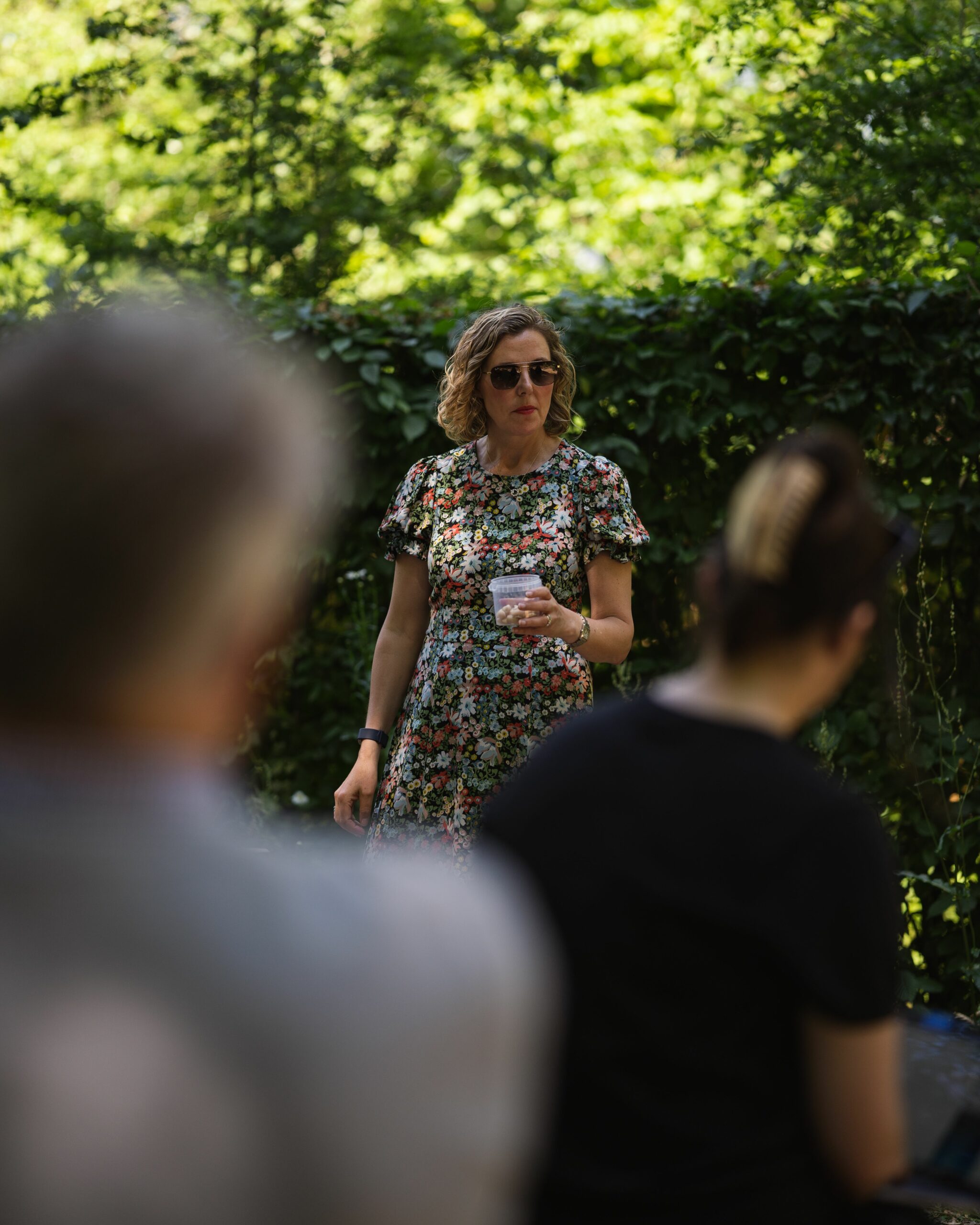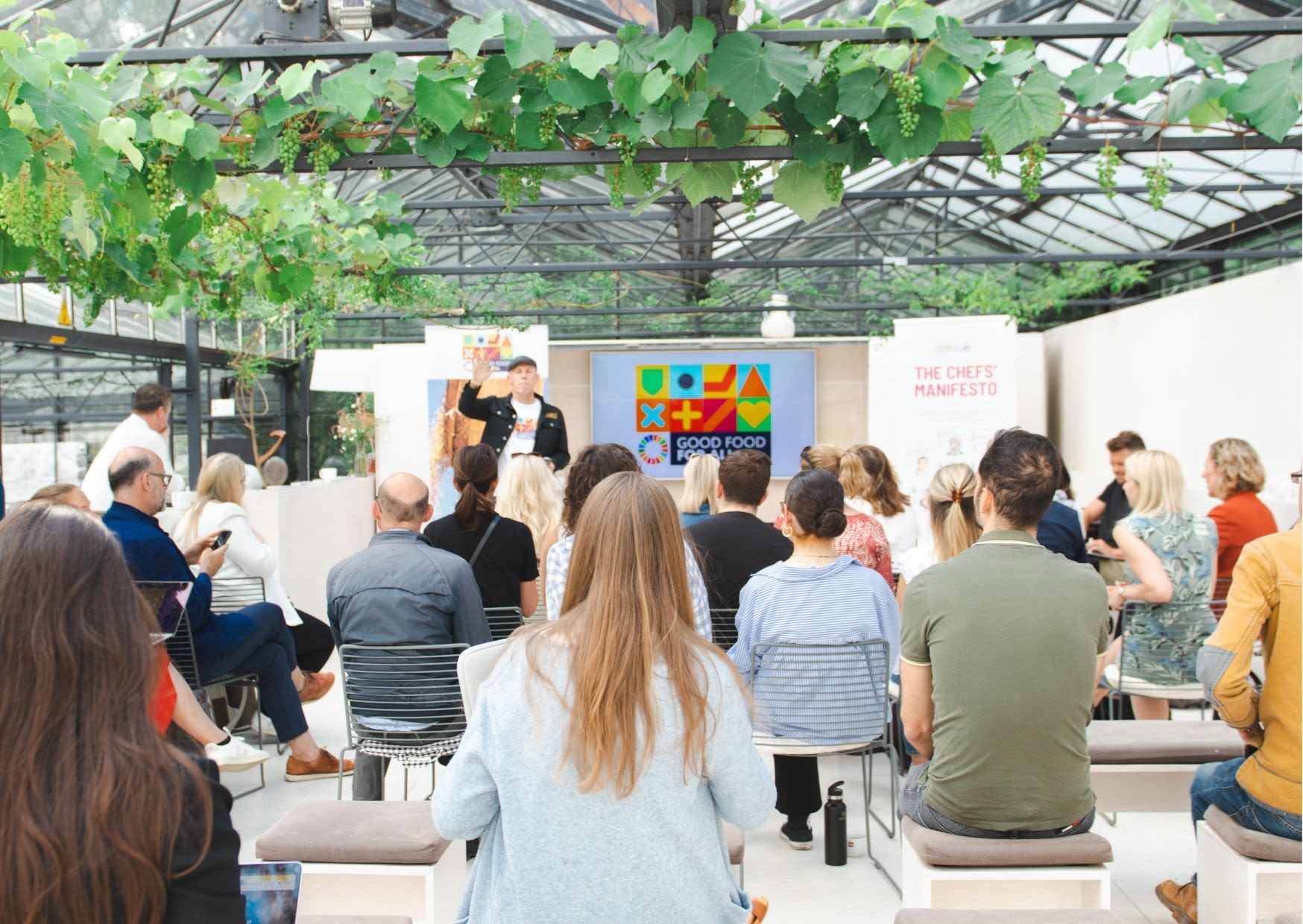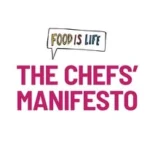
The Chefs’ Manifesto (CM) Action Hub brought together chefs from around the world on the 14-15th of June to share stories, knowledge, dinner, and more! At Omved Gardens in London, the day started with a somber discussion regarding the past few years and working in the industry during the Covid-19 pandemic. From the UK to South Africa, Italy to India, and Norway to Brazil, all chefs experienced similar challenges but were guided by their love of providing good food and supporting their communities.
Despite the stress and uncertainty, these chefs saw an opportunity to face the challenges head-on as they acclimated to a new reality. As restaurants shifted from dine-in to take-out, chefs asked themselves, how can I remain committed to environmental sustainability while protecting and maintaining the livelihoods of the staff in the restaurant? But the chefs did what chefs do best, and with hard work and determination they adapted their operations to not only stay afloat and provide for employees, but many were able to help the community and frontline workers with free meals. To read about a few experiences, visit here.
Overwhelmingly, chefs and their communities, farmers, healthcare workers, and everyone in between felt a deep appreciation and sense of camaraderie around food during this time. During the darkest, loneliest days of the pandemic, food was our comfort and calm that provided a sense of togetherness and caring.
It is this sense of unity and purpose that food provides that will guide us to a more sustainable future for people and the planet.
In the afternoon, attendees divided into groups to learn about nutrition, home growing, school meals, and chefs’ roles in the future of food.

Nutrition
Alyson Greenhalgh-Ball, founder of Conscious Impact, global nutrition leader and executive, taught the group about the general ‘awesomeness’ of beans. She reminded us that human nutrition is complex and there are no heroes or villains in food. Nutritionally, beans are an excellent source of fibre and have great gastrointestinal benefits. The different kinds of fibre found in beans assist in digestion and beyond. In the gut, we each have a unique microbiome that affects how we react to food we eat and determines nutrient absorption. Beans act as a fertiliser in this system which helps keep our microbiome healthy.
As a source of protein, beans are incomplete. However, when paired with certain carbohydrates (see: beans on toast), the two foods complement each other and provide essential amino acids which are necessary for human health. The bioavailability of nutrients, or the extent to which nutrients can be absorbed by specific foods, depends on the food, its level of processing, an individual’s microbiome, and many other factors. In beans, processing can help make the protein more available. Long cook times release anti-nutrients that would otherwise prevent absorption of iron, etc.
The recommended daily intake of protein is 0.8 times body weight in kg.
Growing Beans
Mick Kelly, founder and CEO of Grow it Yourself (GIY) which is also the Chefs’ Manifesto Irish Action Hub, inspired the chefs to grow whatever they can, wherever they can. He believes in food empathy, an important emotion that can change consumer decisions and expand our understanding of food. It comes from growing food and experiencing for oneself the process of production and work that is done with the earth. Food growers eat more plants, waste less food, purchase only what they can’t grow themselves, and have a deep and natural appreciation for the environment. Any change to increase the number of people growing even a very small percent of their food is a benefit – even if it’s just in a window box.
School Meals
Heidi Olli of the UN World Food Programme (WFP), reminded us of the impact a healthy meal can have on a child’s life. If kids are sick (sometimes due to malnutrition) they don’t go to school. They’re not learning. If they’re in the classroom but they’re hungry and distracted, they’re not learning.
Nutritious school meals have been found to increase enrollment, especially among girls, decrease dropout rates, reduce anemia, and save about 10% of monthly income for families.
The WFP is the largest organisation providing school meals globally and reaches 50 million children in 69 countries. They provide all meals throughout the day as well as snacks and work with governments to find the best way to run these programs. In the home-grown school feeding program, local farmers have predictable purchases and kids get healthy, fresh, and diversified food. At the community level WFP teaches nutrition and good eating habits, hygiene, and knowledge of local crops.
Chef James Taylor then shared his story with school meals in Hackney: his experience helping schools in Hackney move to a healthier, more sustainable menu. Chef James has found a way to provide healthy meals that satisfy kids nutrition needs, encourage them to try new foods, and taste great! Not only do the kids enjoy eating the food but the cafeteria staff are excited to prepare it.
The day concluded with a discussion led by Jon Alexander, author of Citizens and founder of the New Citizen Project. He inspired the group to realise the true power of collective action and purpose. If we move away from a consumer story we can harness our true autonomy to create the world we want. His talk inspired an entire dinners worth of conversation, where healthy debate, narrative-sharing and ideation ensued!

